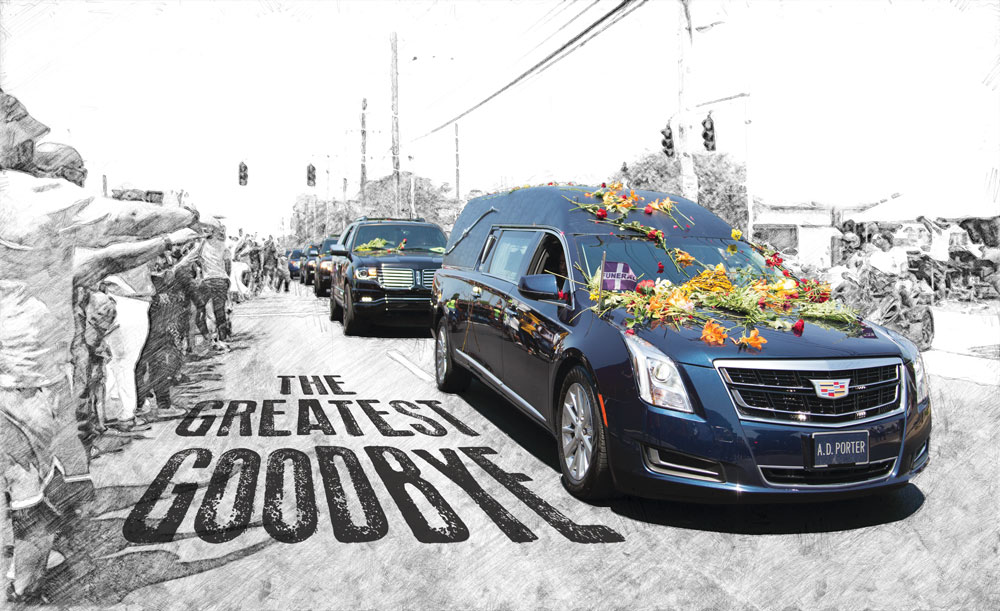It was a tectonic undertaking, The Champ. His wife had bought the plot near the lake eight years ago and instructed everyone to keep it secret. Only it is impossible to bury a giant in secret. When Muhammad Ali died, Cave Hill Cemetery president Gwen Mooney found her phone had exploded with calls, texts, emails. At least 50 media requests. She said nothing, as did the rest of the staff. There was still a lot they didn’t know. Would Ali be interred the following day, per Muslim tradition? Cave Hill Heritage Foundation manager Michael Higgs stashed a suit in his car so he could be ready at any moment. Turned out the burial would not take place for a few days. The internment crew didn’t even know where the grave would be until shortly before they broke earth.
Despite the silence, they came. Reporters, photographers, pilgrims. They climbed over the walls at night, hunkered in bushes, tried to sneak cameras through the gates in the back seats of their cars. Security put up screens to keep lenses from peering inside. The Ali family rented a big tent to go over the grave, attracting more attention. Two reporters sat on a bench in the garden where people scatter the ashes of their loved ones across from the gravesite as Mooney surveyed the place with a member of the Cave Hill Board of Directors, telling him details about the service, where Ali would rest. The next day, a British newspaper printed their conversation. “Almost verbatim,” she says. She’s sure the reporters had bugged the tent. She knew then they’d have to close the cemetery for Ali’s funeral.
Normally it takes two men to dig a grave, but the day before Ali’s service, the entire seven-man internment crew went out to the gravesite to take turns on the backhoe, though one of them was new to the equipment, and had only worked at the cemetery for about seven months. He’d kept a log of all the graves he’d dug, and he scribbled Ali’s information down in the little notebook he carried, the marks describing the resting place of the heavyweight champion of the world as small as all the others — already more than 100 — on the page. The whole crew wanted to contribute to the geological event of shifting Ali from above ground to below. They dug the grave a little wider than usual.
The hot, sunny day of the service, those with tattoos wore long sleeves out of respect, and they waited outside the gates as police completed a sweep of the cemetery with dogs. The procession bled down the road toward the site, and security helped the Ali family up the hill. Then the internment crew lowered Ali down and down. Pallbearers and family filled in most of the grave. The internment crew stayed behind to fill in the rest. A helicopter chopped through the no-flyover rule police had instated. One of the guys on the internment crew thought he could hit it with a well-aimed rock. The CIA helped discourage limo drivers from snapping pics. Mooney told the overnight guards who would protect Ali’s grave for about a month to make sure no one tried to dig up and steal the dirt.
Like an earthquake, Ali reconfigured the cemetery. Management decided to redirect their maintenance route away from his grave, building a new road, and made the road to Ali’s grave one-way to ease traffic, painting it with a green line to lead the 100 or so visitors per day to the monument. There, fans leave photos, flags, boxing gloves, even a rocking chair. The Cave Hill horticulturist kept the plants people left and nourished them in the greenhouse until they could be replanted at the grave. Cave Hill has saved everything, just as the Ali family asked. “Enough to fill about half this room,” Mooney says in her accommodating office. “We go through the grave every day to make sure the items people leave don’t disappear.”

Image: Bill Luster
| PREVIOUS: Maggie Cassaro, Artist | BACK TO INDEX | NEXT: The Mayor's Office |



